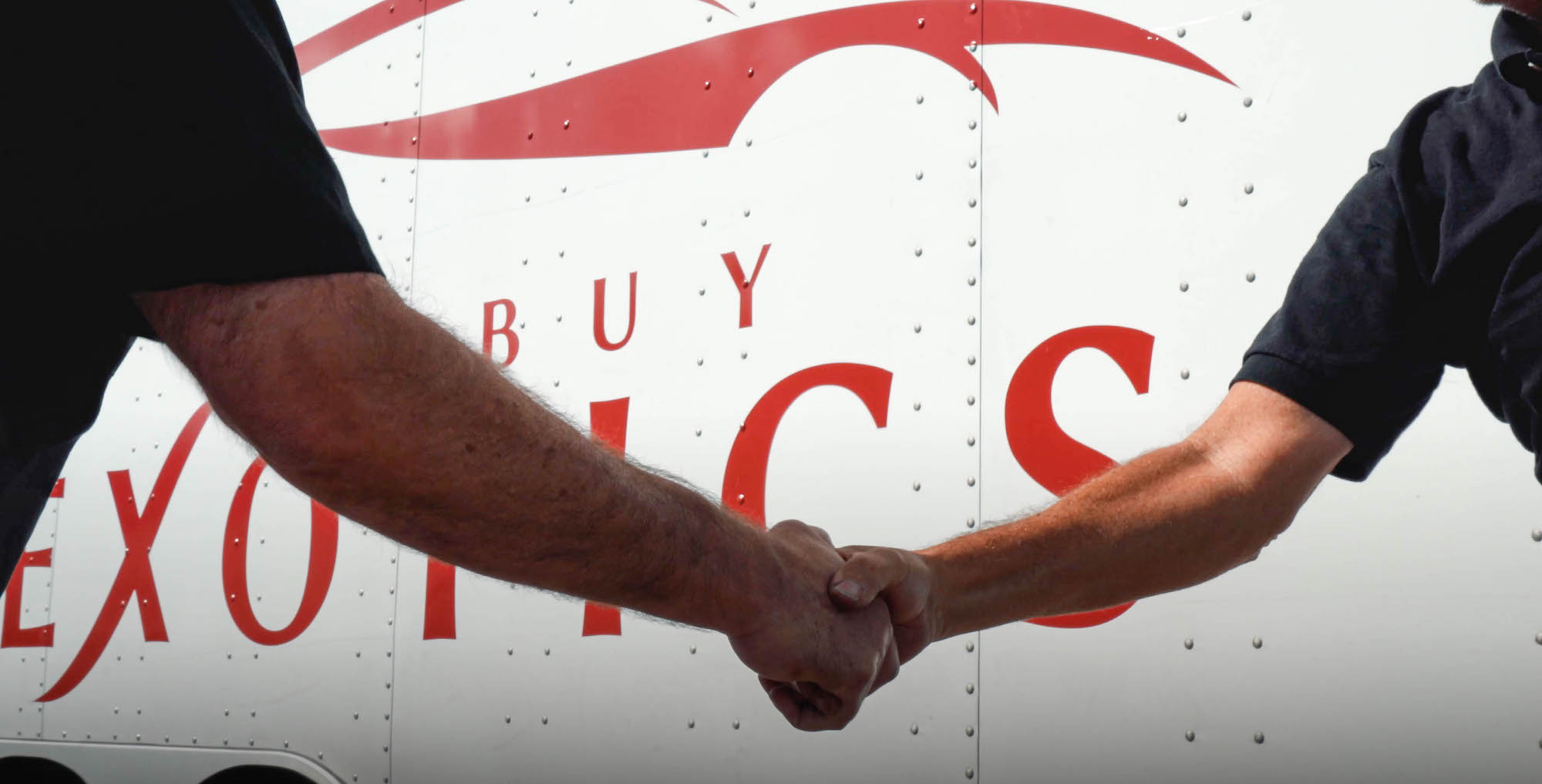The luxury car market has evolved over the last 50 years. No longer are sellers and buyers subject to localized listings and geographically convenient locations. Nowadays, there is a worldwide network of people trading exotics across national and international boundaries. There has never been a better time to sell a luxury car.
That is why sellers of these cars are not only looking for the easiest ways to offload their assets but the best way to get a fair return on their cars in an overall hassle-free transaction.
Take a look at all the methods for selling a luxury car and weigh the pros and cons yourself!
Method #1: Sell it Outright to a Licensed Exotic Purchaser
Licensed exotic buyers, like We Buy Exotics, focus on the hassle-free purchase of high-end cars, such as Lamborghinis, Ferraris, Porsches, Bentleys, McLarens, Aston Martins, Rolls Royces, Maseratis, Mercedes-Benz, BMWs, Audis, Bugattis, Lexus, Teslas, Land Rovers, Lotus, and many other sports cars or supercars.
As experts at forming vehicle valuations with extreme accuracy, luxury car purchasers will quickly get back to the seller with a competitive, no-obligation cash offer based on the information provided (make, model, mileage, and VIN) and current market conditions.
When the offer is accepted, the deal is then processed along with all the legalities, including proper documentation, the vehicle passing inspection, etc.
Once finished, the seller can get the money in just minutes! Even better, some luxury car purchasers like We Buy Exotics will even schedule the car pick-up, meaning they will go out to the seller at no extra cost!
It truly is the most modern and effective method for getting a great return on a vehicle without the time and hassle.
Pros:
- Exotic purchasers have expertise: Licensed exotic car purchasers possess in-depth knowledge about specific brands, models, and market trends, ensuring a smoother transaction process. Also, having experience in real showrooms and garages across the country means exotic purchasers know the importance of offering the best customer service for all luxury brands. Excellence guaranteed.
- Exotic purchasers have sufficient funds: In many cases, a private buyer does not have the funds to make the deal, so the seller has to wait around for banks to approve loans and more. Exotic purchasers, on the other hand, have plenty of cash available on hand to make a reasonable investment in a vehicle right now.
Faster sale: Time is valuable, and sellers can’t afford to sit around and wait for car buyers that will waste their precious time. Working with a licensed purchaser is an extremely SIMPLE transaction where the car is valued and sold, sometimes within less than 24 hours. - Competitive pricing: Licensed purchasers are well-versed in the valuation of classic cars, so they are more likely to offer a fair, competitive, and top-dollar price for the vehicle based on its true market value.
- Easy & convenient: Dealing with professionals who are experienced in exotic car transactions can make the selling process more streamlined and hassle-free. They can handle paperwork, inspections, and logistics, saving the seller time and effort. All the seller has to do is enter the information online for a real cash offer. That’s it.
Cons:
- No haggling: With a licensed purchaser, the offer you receive is the one you get. There isn’t much room for the seller to haggle with the buyer and get a higher price for their car; however, this also means that the exotic purchaser won’t try to bargain the seller down either, saving time for both parties.
Method #2: Sell to a Private Buyer
A little less than half of all car sales are to a private party. What is meant by a “private buyer” is that the car is being sold outside of an institution, and in turn, it is being purchased by someone the seller personally knows or a stranger through a third-party app.
Pros:
- Flexibility: The sellers, themselves, set pricing, handle all promotions, and have the final say in who gets to take over the exotic vehicle. Plus, private buyers might be more open to price negotiations, if the seller is inclined to haggling. Bear in mind that completing a good sale requires masterful marketing and negotiating skills, as they will be vital in determining the return price.
Cons:
- Time-consuming: While it sounds nice to grab a buyer quickly, the reality is quite different. The seller needs to do extensive research on the right price of the car, promote the vehicle through exotic listings (all of which cost a fee), and masterfully negotiate the price.
- Private buyers might not have sufficient funds: If the buyer needs money to purchase the car, sellers have to wait around for loans to approve and, in many cases, the transaction could quickly devolve into a financial mess.
- Long sales process: Since it can be challenging to find an interested and qualified buyer, selling privately is a long-term route to take. The process can drag out for months or even years, and the seller loses car value with each passing month.
- There are lots of tire-kickers out there: Sellers have to sift through a sea of potential buyers to find one that is seriously considering a purchase and not just pretending so that they can take the luxury vehicle on a thrilling test drive.
- Difficult: Most of the burden of documentation falls on the seller, and it is sometimes hard to coordinate the vehicle title transfers, bill of sales, vehicle history reports, and more.
Method #3: Sell or Trade in the Car To a Dealership
To trade in an old car for a new vehicle, the seller would have to go to an exotic car dealership rather than a standard car dealer. In most cases, they would bring the car to the same brand dealership as the make and model of their vehicle (taking a BMW to a BMW Dealership, for example), as this dealership will be most willing to take the vehicle off the seller’s hands.
The dealers would then offer a price to go towards the seller’s next car purchase; meanwhile, the dealership can turn around and sell the used car on its own lot.
Pros:
- Reliability: Dealerships are well-run machines, and more than half of all car trade-ins happen at dealerships. They have the resources to purchase anything they see as a substantial investment and access to a broad distribution and financial services network.
Cons:
- Lower trade-in value: Dealerships make lower offers because they know the longer sales cycle associated with an exotic vehicle and want to price it accordingly. Plus, they need to account for their own profit margin when reselling the car, which can result in a less favorable trade-in offer.
- Sellers have less negotiation power: Dealerships have more experience in negotiating and might use their expertise to offer a lower trade-in value. This can make it challenging for sellers to negotiate a fair price for the trade-in.
- Cross-selling pressure: When sellers trade in a car at a dealership, there’s a chance that the dealerships will try to cross-sell them on a new or used vehicle from their inventory. This can lead to cross-selling pressure and might not align with the seller’s original intentions.
- Limited transparency: Dealerships might not provide complete transparency about how they determine the trade-in value. This lack of transparency can leave sellers uncertain whether they receive a fair offer.
- Restrictions on vehicle choice: If trading in a car as part of a new purchase, the options for the new vehicle might be limited to what the dealership has in stock. This could limit choices compared to buying from a larger market.
Method #4: Consign the Car (Physically or Virtually)
Similar to going to a typical dealership, consigning a car refers to an arrangement in which the owner of a vehicle entrusts the car to a third party (a virtual consignment service or a physical dealership specializing in consignment, etc.) to sell the vehicle on their behalf.
The car owner retains ownership of the vehicle, while the consignee (the party responsible for selling) handles the process of showcasing, marketing, and selling the car to potential buyers.
Pros:
- Marketability: Consignment services and dealerships have more foot traffic to be able to get a car in front of buyers. They have the resources to effectively market and sell the vehicle, which can save sellers time and effort that would otherwise be spent on advertising, negotiation, and paperwork.
Cons:
- Less-than-ideal returns: When using a consignment program, sellers won’t receive the selling price of the luxury car because of having to work with a middleman. After all, the consignment dealer will charge a fee that will eat into the profits significantly.
- Seller assumes all the risk: What’s important to note is that the seller still owns the car. He or she is still paying things like insurance and upkeep of the car, and if the car breaks, the seller is responsible for all charges. With this route, sellers typically sell the car later for less money than what you could have sold it for initially, all the while assuming all the risk during the process.
- Can’t always trust consigners: Consigners are going to tell sellers whatever they want to hear to get a free asset out of them, so there is always a risk of fraud or mismanagement—or sellers simply run the risk of handing over an asset to someone who doesn’t understand the true value of the exotic car.
- Lengthy selling process: The whole consignment process can take a long time as the dealer may have multiple cars to sell—and the seller’s particular car might not be their top priority. Collector cars, in particular, can be sensitive to market value fluctuations, and extended periods of time on the consignment lot will result in a lower sale price.
Weighing the Pros and Cons: Choose We Buy Exotics
Avoid the hassle of looking for reliable prospective buyers and get the best price for your car’s value with We Buy Exotics. We are interested in all manner of luxury sedans and luxury SUVs. We‘re simple, fast, and reliable experts.
With just a little bit of information from you, we can send you a near-instant cash offer for your vehicle.
It‘s simple:
- Submit your VIN, model and make information
- Receive your cash offer in just minutes
- Get your cash moments after you sign off on the terms
- Schedule the pickup time
No matter where you are, you can receive a cash offer within minutes, and no matter where you’ll be, you can schedule a convenient pick-up to finalize the exchange.
We make the exotic vehicle-selling process quick, easy, and profitable for YOU. Getting top dollar for your used luxury car has never been easier, guaranteed. Call us now to learn more!

 WHY US
WHY US
 SELL YOUR CAR
SELL YOUR CAR
 TESTIMONIALS
TESTIMONIALS
 FAQ
FAQ
 CONTACT US
CONTACT US







